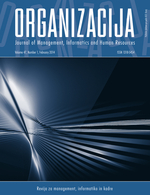The Use of the Kano Model to Enhance Customer Satisfaction
Abstract
Background/purpose: The interest of measuring customer satisfaction is reflected in its ability to gain customer loyalty, enhance favourable word of mouth, lead to repeat purchases and improve a company’s market share and profitability. The issue of integrating the Kano model of customer satisfaction with other models and tools to support development or improvement of a product, or to determine market strategies, is relatively unexplored in the Slovenian sector. This research aims to construct the Kano model in order to enhance customer satisfaction in the case of home appliances. Design/Methodology/Approach: Data was collected using an online survey amongst randomly selected individuals from the service interventions for an end users database. Principal component factor analysis was first used to identify the underlying factors of home appliance characteristics. In the next phase we calculated the derived and stated importance of customer satisfaction, which was then used to construct the Kano model of customer satisfaction. We further analysed which factors are the strongest drivers, or predictors, of repeat purchase using multiple regression analysis. Results: In the study we identified the underlying home appliance factors. The results show that these factors are: sales environment, price, user features, design features and technical features. The results were then used to construct the Kano model where the analysis goes beyond the qualitative analysis by implementing two approaches, stated and derived importance approach. According to the Kano model, marketers should concentrate on delight characteristics such as: wider knowledge of the salesperson, professional skills of the salesperson, design of home appliance, brand of home appliance. What is more, factors called ‘user features’ are the strongest predictors of repeat purchase. Conclusion: This paper links the Kano model with measuring customer satisfaction and presents a contribution for marketing research theory. Therefore, the results could be used to support optimization of business decision-making, as well as for further scientific research.
Refbacks
- There are currently no refbacks.

